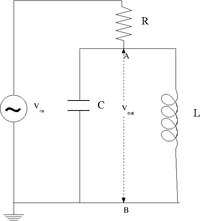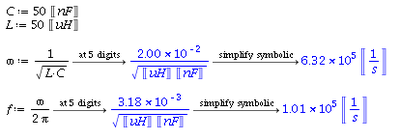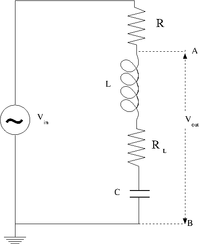Lab 5 RS
Jump to navigation
Jump to search
- LC Resonance circuits
The LC cicuit
- Design a parallel LC resonant circuit with a resonant frequency between 50-200 kHz. use = 10 - 100 , R = 1k
.
I choose the following values for and :
So the resonance frequency is
Or
Let's estimate:
- Construct the LC circuit using a non-polar capacitor
- Measure the Gain as a function of frequency. (25 pnts)
- Compare the measured and theoretical values of the resonance frequency () (10 pnts)
Questions
- Is there a value of in which at resonance. What is the value?(5 pnts)
The RLC cicuit
- Design and construct a series LRC circuit.
- Measure and Graph the Gain as a function of the oscillating input voltage frequency. (25 pnts)
- Measure and Graph the Phase Shift as a function of the oscillating input voltage frequency. (25 pnts)
Questions
- What is the current at resonance? (5 pnts)
- What is the current as ? (5 pnts)
- LC Resonance circuits
The LC cicuit
Design a parallel LC resonant circuit with a resonant frequency between 50-200 kHz. use = 10 - 100 .
I choose the following values for and :
So the resonance frequency is
Or
Let's estimate:
Construct the LC circuit using a non-polar capacitor
Measure the Gain as a function of frequency. (20 pnts)
Measure the Gain when an external resistance approximately equals to the inherent resistance of the rf choke . (20 pnts)
Compare the measured and theoretical values from the resonance frequency () and the Quality factor value for each case; . (10 pnts)
Questions
- If r=0, show that . (10 pnts)
- Show that at resonance. (10 pnts)
The LRC cicuit
- Design and construct a series LRC circuit.
- Measure and Graph the Gain as a function of the oscillating input voltage frequency. (20 pnts)
Questions
- What is the current at resonance? (5 pnts)
- What is the current as ? (5 pnts)


